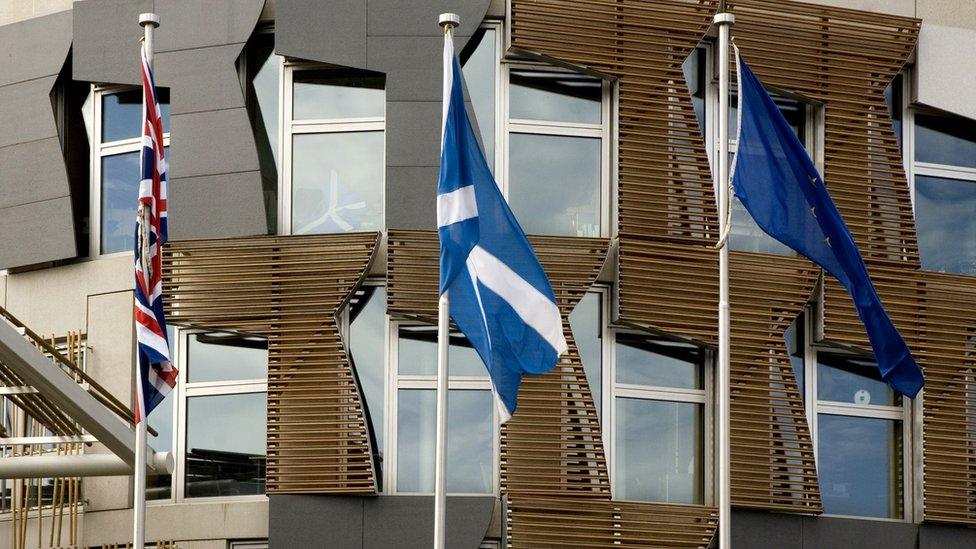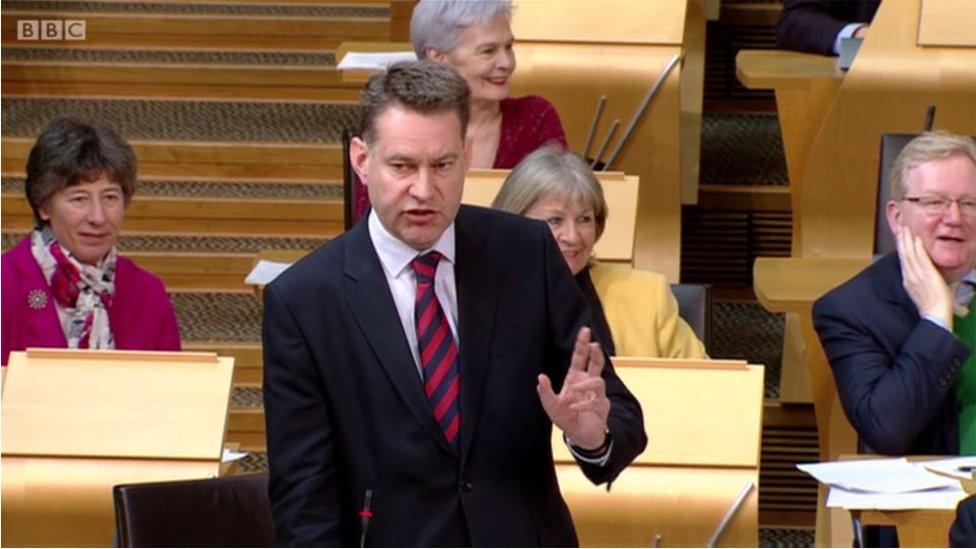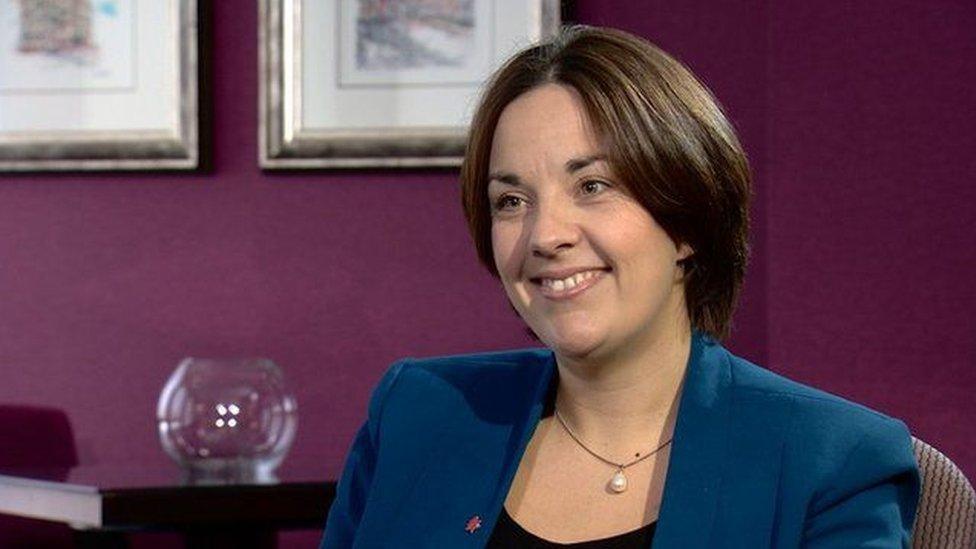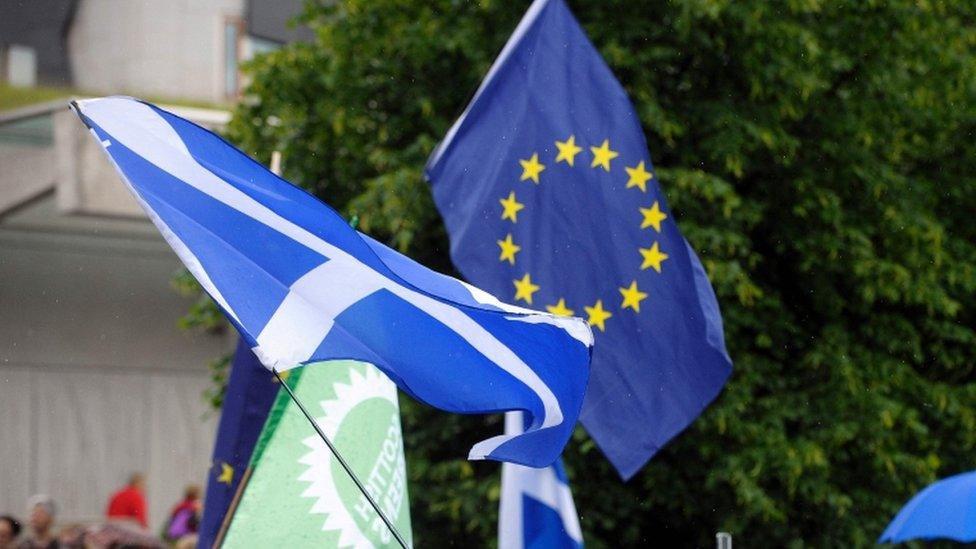Growing calls for federal UK in wake of Brexit vote
- Published

Could federalism let Scotland remain in the UK and the EU?
For years, nay decades, it was a topic only touched, if at all, by eager Liberals at party conferences. If not actually shod in sandals at the time, you could tell they were yearning to return to their favoured footwear, when convenient.
The topic? Federalism, of course. It has been on Liberal (and now Lib Dem) stocks for so long, it has tended to suffer a little from benign neglect. Like much-loved socks stuffed at the back of a drawer.
Liberals were sincere, of course. They meant it. They advocated federalism. But, occasionally, one was left with the impression they had not fully thought through the consequences for disparate governance in these islands.
They believed in federalism. They had always believed in federalism. QED.
But now? Why, federalism is the topic du jour or, more precisely, de la semaine. Only this week, not one but two senior politicians from Scotland have advanced its merits.
Today we heard from Murdo Fraser, in a published paper. Mr Fraser is a thinking Conservative who blends serious contemplation with a charming capacity for ironic self-deprecation.

Murdo Fraser said the "time has come" for a federal UK, with a written constitution
In a report for Reform Scotland, he says federalism is an idea whose time has come. Mr Fraser says that the disparate nature of the vote in the EU referendum - Scotland and Northern Ireland Remain, England and Wales Leave - reinforces the case for further decentralisation in the UK.
According to Mr Fraser, the answer is federalism. An entrenched Scottish Parliament, an English Parliament sharing time at Westminster, English city regions with administrative but not legislative power, the replacement of the House of Lords with a senate representing "each federated part of the UK."
I do not intend in these musings to examine this particular set of ideas too closely. My attention is more aimed at the other advocate of federalism this week, Labour's Kezia Dugdale.
Practical difficulties
But perhaps I might note that there would remain practical difficulties, largely caused by the mismatch in size between Scotland and England. Federalism between those two territories would be like federating California and Connecticut. Without the other 48 US states for counter-weight.
Say there is a Tory majority in England and a Labour majority in the UK. Would the Tory first minister in England, representing the vast majority of the UK population, be content to have, say, defence and foreign policy decisions taken by the Labour UK leader?
Well, perhaps, that is a consequence of federating. And perhaps Murdo Fraser is right to say that his plan answers both West Lothian and the issue of the Upper House in a single bound.

Labour's Kezia Dugdale said federalism could be an answer to questions posed by the Brexit vote
Let us leave that to one side for a moment, aware that it is a topic which we shall address again. Let us instead consider the contribution advanced by Kezia Dugdale, the Scottish Labour leader.
She not only advocated federalism in a speech this week. She went further and suggested it might offer a solution to the Brexit dilemma for Scotland.
To be fair, Ms Dugdale does not advance that case with any obvious vigour. Indeed, she notes that her proposal is set forward "tentatively". But she does say "there might be a possibility that Scotland could retain its place both in the UK and in the EU" through such a solution.
That dual approach, says Ms Dugdale, was endorsed by the people of Scotland in two referendums, 2014 and this year.
German model
I have to say it is not immediately apparent to me how EU membership would be achieved via federalism.
For one thing, the EU is a creature of treaty. Between member states, not their constituent parts. Germany is already a federal state.
The Länder take part in consideration of EU proposals when the topic in question forms part of their competence.
But it is still Germany as a whole which is the member, bound by treaty. I cannot instantly see how, for example, Baden-Württemberg could retain links with Brussels if Berlin had declared that Germany was leaving the EU.

Germany is an example of a federal state - but could its model work in the UK?
Further, how would federal Scottish membership of the EU operate? We are presuming that England and Wales have left the EU - and its treaty obligations - on the basis of the referendum outcome in those territories.
Could Scotland alone be a federal part of the single market? How would that operate when Scotland would remain part of the UK, part of its tax system, part of its banking system, part of its monetary system?
If Scotland, alone, were in the single market, would there continue to be freedom of movement of labour between Scotland and the EU? That might be thought to be a contingent element of retaining the single market.
But if EU workers remained free to travel to Scotland in search of employment, how could they be prevented from popping down the M74 to England, to Manchester, to Liverpool, to London? To areas, in short, which would be by then outside the EU.
Remember it is not proposed that Scotland leaves the UK, under this scenario. It is federalism, not independence. There would not be a formal border at Carlisle or Berwick. How, then, could freedom of movement operate?
Ms Dugdale says there is a duty placed upon her and all of us to pay heed to the democratic mandate delivered by the people of Scotland. Which is intriguing given that an unalloyed supporter of the Union - like Ruth Davidson, for example - would say that Scotland's votes contributed to a UK mandate, rather than comprising one in their own right.
Nevertheless, the Labour leader is undoubtedly right to argue that all avenues should be explored in response to the Brexit vote. Some, I would tentatively suggest, are likely to prove more productive than others.
- Published9 July 2016

- Published7 July 2016

- Published30 June 2016
